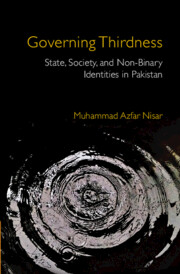Book contents
1 - Governance, Thirdness, and the Khawaja Sira of Pakistan
Published online by Cambridge University Press: 10 December 2021
Summary
In 2009, a few khawaja sira returning from a private wedding were arrested, maltreated, and harassed by some local policemen in Taxila, Pakistan. This incident, although no different from many others in a long history of violence and exclusion faced by the khawaja sira in Pakistan, proved momentous. Moved by their plight, Aslam Khaki, a local jurist filed a writ petition in the Supreme Court of Pakistan about the legal rights of the khawaja sira (Redding 2015). From 2009 to 2011, the Supreme Court of Pakistan gave multiple directives regarding the social position and legal identity of the khawaja sira, the most prominent of which was the creation of a new gender category to recognize their unique identity. In the final decision, the Supreme Court declared that the khawaja sira
in their own rights are citizens of this country and subject to the Constitution of the Islamic Republic of Pakistan, 1973, their rights, obligations including right to life and dignity are equally protected. Thus, no discrimination, for any reason, is possible against them as far as their rights and obligations are concerned.
This decision was the first time that the historically marginalized khawaja sira community of Pakistan was recognized by the legal and administrative apparatus of the country.
After the Supreme Court decision, the National Database and Registration Authority (NADRA)—the public agency in Pakistan which issues legal IDs (known as Computerized National Identity Cards or simply CNIC)—created a third gender category, officially called ‘Khawaja Sira’, in its national registration system. Celebrated at the time as a watershed moment by human rights advocates, there were high hopes associated with the Supreme Court decision. It was assumed at the time that legal recognition would also result in better socioeconomic inclusion of the khawaja sira community of Pakistan. However, the subsequent limited impact of this case on the lives of the khawaja sira and the almost unanimous disavowalof the legal third gender category by the khawaja sira community tells a completely different story.
In this story, legal recognition of marginalized groups like the khawaja sira community, especially when done on the basis of problematic discourses, represents a minor part of the socio-administrative apparatus that governs their lives.
- Type
- Chapter
- Information
- Governing ThirdnessState, Society, and Non-Binary Identities in Pakistan, pp. 1 - 19Publisher: Cambridge University PressPrint publication year: 2022

